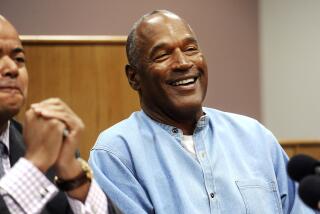Speaking for the Minority : NONFICTION : REASONABLE DOUBTS: The O.J. Simpson Case and the Criminal Justice System.<i> By Alan M. Dershowitz (Simon & Schuster: $20, 209 pp.)</i>
- Share via
Opinion polls continue to show that most Americans disagree with the jury that acquitted O.J. Simpson. But not Alan Dershowitz. A Harvard law professor and a member of the Simpson defense team, he argues that there was indeed enough reasonable doubt to warrant a verdict of not guilty.
Why, then, do so many people question the verdict? Dershowitz offers several explanations. First, he says, many Americans don’t understand the rigorous demands of the “proof beyond a reasonable doubt” standard. He contends that people overly trust the police and give insufficient weight to the fact that two key police witnesses lied during the trial. He maintains that people were swayed by information the jury did not hear. Finally, he claims we were misled by pro-prosecution reporters, and especially by inept and biased commentators.
Dershowitz does a masterful job of explaining legal concepts in clear, understandable language. Yet “Reasonable Doubts” ultimately disappoints because it provides so little that is new. The description of the flaws in the prosecution evidence is virtually identical to that given by defense attorneys Johnnie Cochran and Barry Scheck in their closing arguments.
Moreover, the book is so one-sided in presenting the defense view that it fails to demonstrate the correctness of the jury’s verdict. For example, many believe that the blood in the Bronco that matched the victims was among the prosecution’s strongest evidence. Dershowitz says that the jury reasonably could have believed that Mark Fuhrman placed it there by wiping the bloody glove inside the car. But there was not a shred of evidence that Fuhrman ever was in the car or had the chance to be there, since it was locked.
Dershowitz presents every defense argument as if it were true and decisive. He presents numerous explanations for why people disagree with the jury, but overlooks one crucial possibility: people know the evidence and believe Simpson guilty beyond a reasonable doubt.
More to Read
Sign up for our Book Club newsletter
Get the latest news, events and more from the Los Angeles Times Book Club, and help us get L.A. reading and talking.
You may occasionally receive promotional content from the Los Angeles Times.










